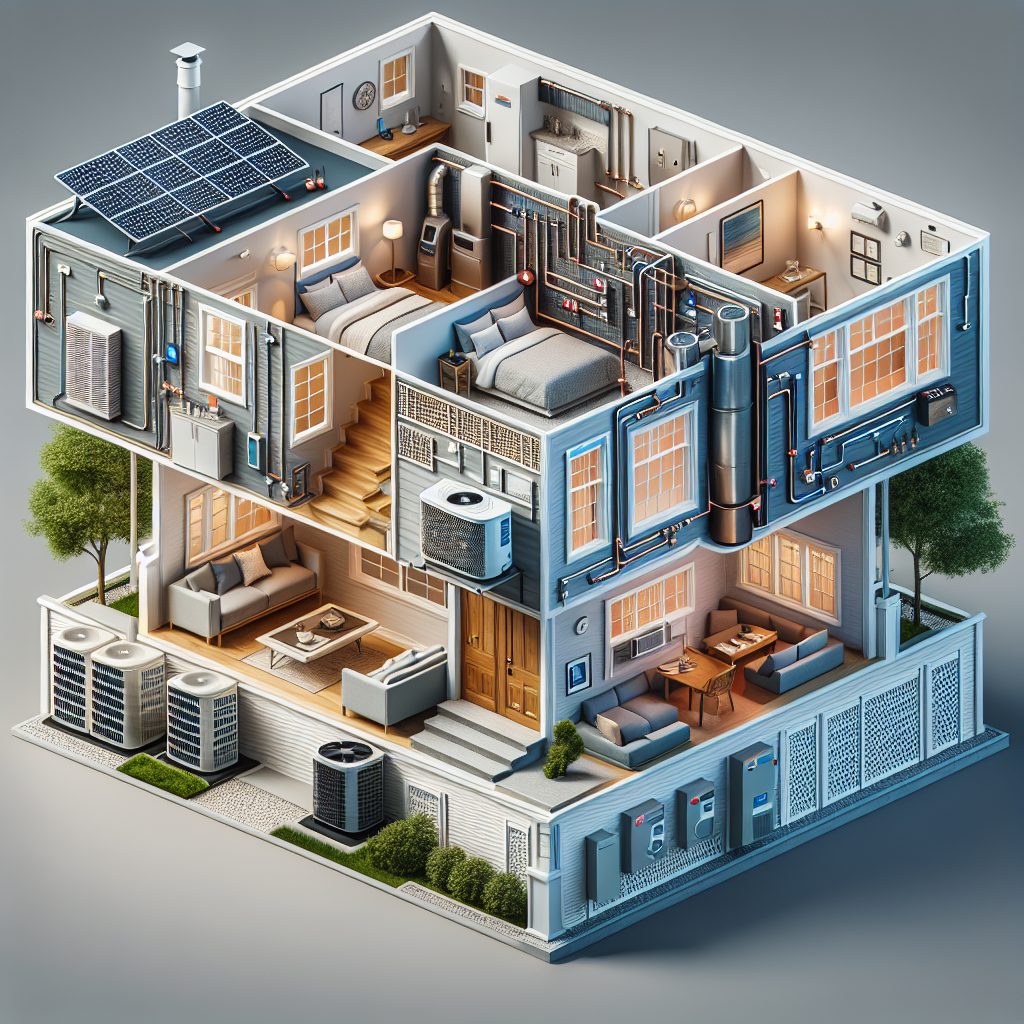
Keeping your home comfortable can be both a challenge and an investment. Choosing the right HVAC system for your home is an important step towards making sure you meet both of these goals. The right HVAC system will provide the comfort you need while efficiently using energy and resources. There are many factors to consider when it comes to selecting the right HVAC system for your home. Temperature, air quality, and budget are just some of the important considerations when selecting the optimal system. Additionally, there are differences between cooling and heating systems to be aware of. This article will discuss the key factors in selecting an HVAC system in order to make the most suitable choice for your needs. By considering the factors discussed here, you’ll be able to find a system that provides optimal comfort while minimizing energy and costs.
Key Takeaways
1. High-efficiency systems include multiple components like variable refrigerant flow systems, two-stage furnaces, and geothermal systems.
2. Different types of systems come with different levels of efficiency. A standard system will generally feature an SEER rating of 13 or 14, while high-efficiency systems can typically reach ratings of up to 25.
3. When selecting the right system for your home, it is important to do a careful analysis of your home’s needs, and to consider the size, climate, and efficiency level that will best suit your home.
4. Duct systems, insulation, air circulation, and the size of the HVAC unit should all be taken into consideration in addition to the type of system that you select.
5. It is important to research and work with a qualified HVAC contractor, and to make sure that all of the components work together in order to achieve the maximum level of efficiency, savings, and comfort.
What is the Best HVAC System for My Home?
What Should I Consider When Buying an HVAC System?
When purchasing a new HVAC system, it is important to consider a few key factors. Firstly, consider the size of your home. If you buy an HVAC system that is too big, the system may be too powerful for your home and may leave some rooms too cold or hot. The system must also be equipped with the proper equipment for your type of home. One size does not fit all when it comes to heating and cooling systems. Next, consider what type of maintenance is needed to keep your system running smoothly. Most systems require regular filter changes and professional servicing. Lastly, be sure to consider your budget and whether or not you can install the system yourself or if you will need to hire a professional.
How Do I Determine the Size of HVAC System I Need?
The size of the HVAC system needed for your home depends on the square footage. Generally speaking, for every 500 square feet of living space, you will need about one ton of cooling, so if your home is 2,500 square feet, you will need a five-ton unit. It is important to get the size right so that your system will be able to efficiently heat and cool your home without wasting energy. It is best to consult with a professional to determine the size of system you need.
What are the Different Types of HVAC Systems Available?
The two most common types of HVAC systems are split systems and packaged systems. Split systems are typically installed in larger homes and consist of two individual components, an outdoor unit that houses the condenser, compressor, and evaporator, and an indoor cabinet, which houses the evaporator coil. Packaged systems are pre-assembled and designed to fit in small spaces with limited space for typical HVAC components. When purchasing an HVAC system, it is important to consider the efficiency rating to determine which system will provide you with the most savings.
What are the Benefits of a Smart HVAC System?
Smart HVAC systems provide homeowners with convenience and energy savings. With a smart system, homeowners can turn on their system with the voice command, control system temperatures remotely with an app, and schedule heating and cooling to optimize efficiency. Smart systems can also detect when a home is occupied and adjust the temperature accordingly, so that energy is not wasted unnecessarily.
How Much Does an HVAC System Cost?
The cost of an HVAC system can vary significantly depending on the size of the unit and the manufacturer. Generally, a good-quality, mid-sized system can cost anywhere between $4,000 and $10,000. Installation and labour costs can also vary widely, from a few hundred dollars up to several thousand.
Tips for Choosing the Right HVAC System for Your Home
1. Calculate the size of the HVAC system you need based on the square footage of your home.
2. Consider the type of HVAC system that best suits your home and budget.
3. Investigate the efficiency ratings of various systems to find the one that offers the most energy savings.
4. Invest in a smart thermostat for added convenience and energy savings.
5. Have a professional install your system to ensure it is done properly.
What’s an HVAC system?
HVAC stands for “heating, ventilation, and air conditioning.” It implies to the combined climate control system in buildings and homes used for regulating humidity and temperature inside. The system can also provide fresh air and reduce outdoor contaminants. Although it sounds complex, an HVAC system is just a set of parts working together to create a comfortable and safe living environment.
How Do I Choose the Right HVAC System?
Choosing the right HVAC system for your home depends on a few factors, including home size, ventilation requirements, local climate, design features, fuel types, and any other desired features. Doing some research and consulting with professionals is key for choosing the right system, as it ensures that the right technology is specified and sized correctly.
What Are the Benefits of the Right HVAC System?
The most obvious benefit of having the right HVAC system is that it will make your home comfortable all year round. On top of that, an HVAC system can reduce energy use through smart controls like thermostats. Additionally, air filtration systems can help reduce allergies and provide safer, fresher air.
What Are the Different Types of HVAC Systems?
HVAC systems are typically broken down into two main categories: ducted and ductless. Ducted systems are ideal for larger homes since they transport conditioned air from a central unit throughout the whole house, while ductless systems provide flexibility with individual zones for each room.
What Should I Consider When Shopping for an HVAC System?
When shopping for an HVAC system, you should consider the cost associated with installation, the size of the system, the energy efficiency ratings, the warranty coverage, the safety features, and the ease of maintenance. Additionally, you should always consult with an HVAC professional to ensure that the system you purchase meets all of your requirements.
What Are the Different HVAC System Components?
The main components of an HVAC system include a thermostat, a ductwork system, an outdoor unit, and heating and cooling elements. Depending on the model of the system, these components could also include air filters, fans, air cleaners, water heaters, and evaporative coolers.
Are There Different Types of Thermostats for HVAC Systems?
Yes, there are different types of thermostats for HVAC systems. Generally, these include digital, mechanical, and programmable thermostats. Digital thermostats offer precise temperature control and are easier to use, while mechanical thermostats are cheaper but don’t offer as much accuracy. Programmable thermostats are great for saving energy by adjusting temperatures according to pre-set schedules.
What Kind of Maintenance Do HVAC Systems Require?
To ensure the safe and proper functioning of an HVAC system, it needs to be regularly maintained. This includes cleaning and checking filters regularly, testing thermostat settings, checking seals and connections, and inspecting the ductwork for any blockages. Additionally, it is important to have the system inspected twice a year and any necessary repairs carried out by a qualified HVAC professional.
Are Newer HVAC Systems More Energy-Efficient?
Yes, in general, newer HVAC systems are more energy-efficient than older models. This is because newer systems typically have advanced technology that allows them to respond to changing conditions more quickly. In addition, many newer systems are designed with energy-saving technology, like programmable thermostats or zone control systems, that increase efficiency even further.
Would Installing an HVAC System Affect My Home’s Value?
It depends on what kind of HVAC system you are installing and how much energy savings it can bring. If the system is energy-efficient and provides long-term energy savings, then it can substantially increase your home’s value. However, if the system is not energy-efficient, it may not have a positive impact on your home’s value.
Are There Different Types of Fuel Used by HVAC Systems?
Yes, HVAC systems can use a variety of different fuels, ranging from natural gas, propane, and oil to electricity. Each type of fuel has its own advantages and disadvantages, so it is important to do some research and consult with a professional to determine which type of fuel is best for your needs.
Final Thoughts
Choosing the right HVAC system for your home can be a tricky process, as there are many different kinds of systems and fuel sources available. The best way to ensure that you get the best system for your needs is to do some research and consult with an HVAC expert for help. Consider all of your options and keep in mind factors such as cost, energy efficiency, warranty coverage, and ease of maintenance.
Regardless of what type and size of HVAC system you choose, regular maintenance is required to ensure its safe and optimal functioning. Keeping up with regular maintenance, such as checking and changing filters, will help prolong the life of the system as well as reduce energy consumption and bills.



